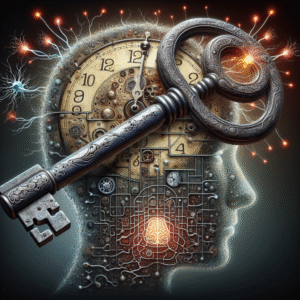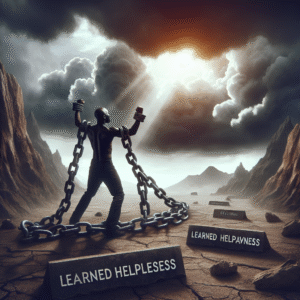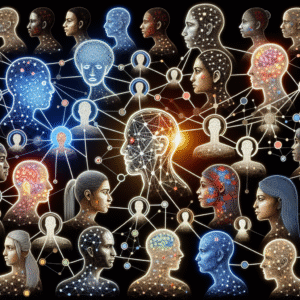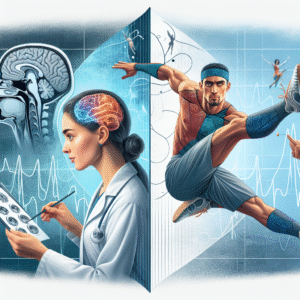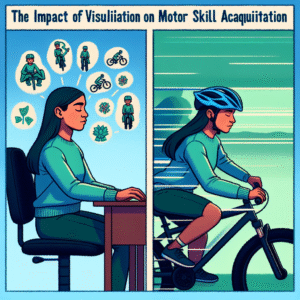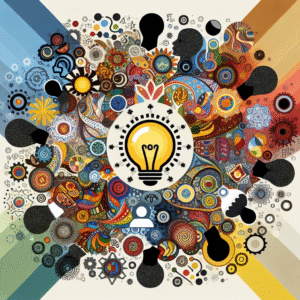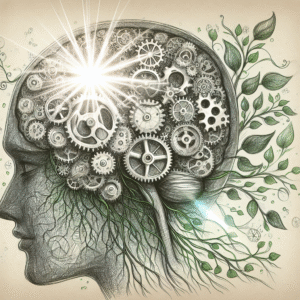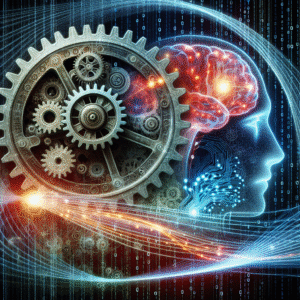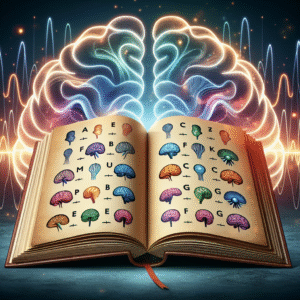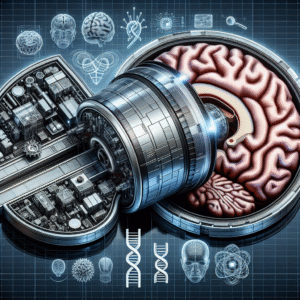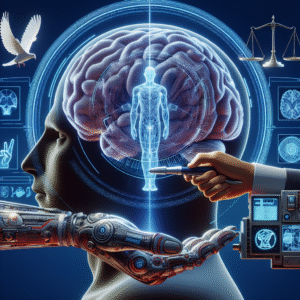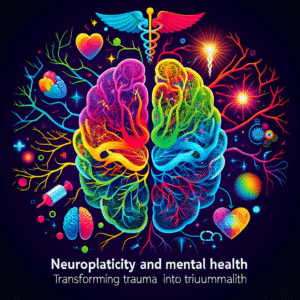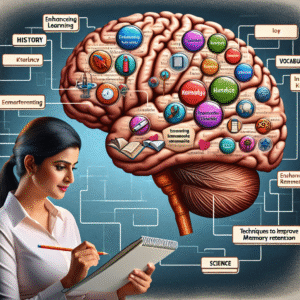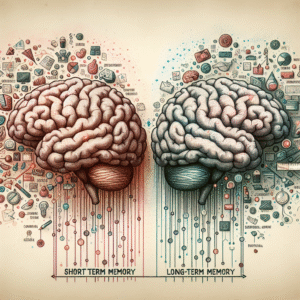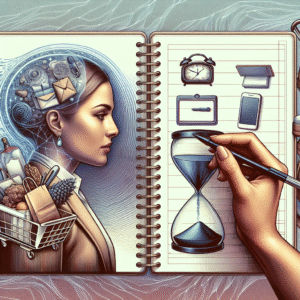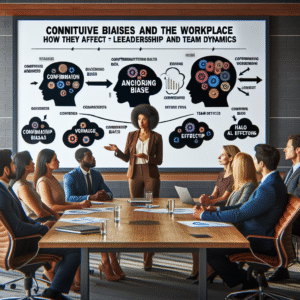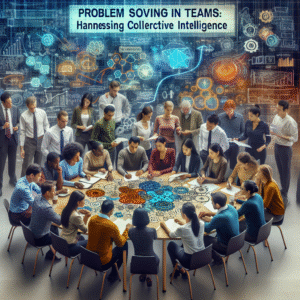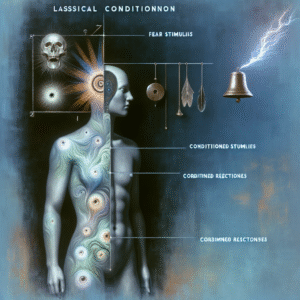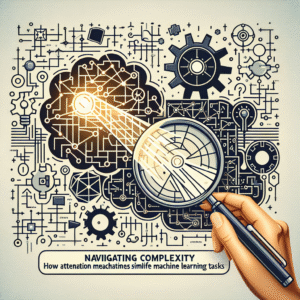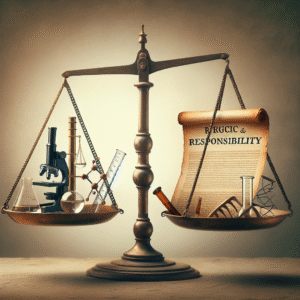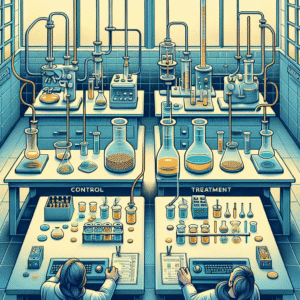Introduction Have you ever found yourself paralyzed by self-doubt, listening to that incessant voice in your head telling you, "You can’t do this," or "You’re not good enough"? This inner critic can be relentless, sabotaging our confidence, creativity, and overall happiness. If you’re nodding in agreement, you’re not alone. Many of us struggle with negative self-talk and the adverse...
Language Acquisition
Introduction Stress is an omnipresent facet of modern life, often viewed as a foe that must be defeated. Yet, what if we could approach it differently—transforming it into a powerful ally? In our quest for understanding, we find ourselves at the intersection of behavioral neuroscience and everyday experiences, revealing profound insights. Unlocking the Secrets of Stress: Behavioral Neuroscience Perspectives...
Introduction Imagine you’re gearing up for a big presentation. You’ve rehearsed for weeks, but your heart races as you enter the room filled with fellow colleagues. To your surprise, instead of feeling anxious, your adrenaline kicks in, and you deliver an unforgettable performance. What just happened? This phenomenon is known as social facilitation, and it’s a crucial aspect of...
Introduction Have you ever stopped to consider how age influences the way we perceive speech? This question is not merely academic; it resonates deeply across various fields such as psychology, linguistics, and audiology. As we age, our cognitive processes, sensory abilities, and life experiences shape how we interpret sounds and speech. The impact of age on speech perception is...
Introduction: The Strength Within In a world filled with challenges and uncertainties, the concept of resilience has never been more crucial. Many adults face situations that foster a mindset of learned helplessness, where they feel powerless to change their circumstances. This mindset can stem from various experiences, such as traumatic events, chronic stress, or even consistent failure. Yet, within...
Introduction In an era defined by rapid technological advancement, the intersection of technology and language acquisition has never been more pronounced. The significance of The Impact of Technology on Language Acquisition in the Digital Age cannot be overstated; it influences how we learn, teach, and engage with languages across the globe. As more people turn to digital platforms for...
Introduction Imagine walking into a room filled with laughter; within moments, a smile spreads across your face, and a lightness fills your heart. Now, switch the scene to a crowded subway where frustration and annoyance hang thick in the air. Feeling uneasy, you can’t shake the nagging anxiety. What just happened? This phenomenon—that emotions can influence those around us—leads...
Introduction Picture this: you’re at a bustling cafe, your eyes darting around, taking in the sights and sounds. Suddenly, a friend waves at you from across the room. Without thinking, your body springs into action—your brain coordinates your movements, and you’re out of your chair and waving back. This stunning interplay between perception, motor skills, and cognitive processing underscores...
Introduction Imagine a pebble thrown into a still pond. As it lands, ripples begin to spread outward, touching everything in their wake. Now, imagine those ripples symbolize our thoughts, beliefs, and expectations—each one igniting a chain reaction that can reshape our society. Welcome to the world of self-fulfilling prophecies. This concept—where believing something can lead to its actualization—has powerful...
Introduction: Unlocking Potential through the Power of the Mind Imagine an aspiring athlete who visualizes themselves executing a flawless routine before stepping onto the field. Every movement is precise, every breath is measured, and success radiates from their very being. This scenario epitomizes the transformative nature of visualization in motor skill acquisition—a tool that transcends mere imagination to enhance...
Introduction In an increasingly interconnected world, understanding how our backgrounds influence our social cognition has never been more critical. The intersection of culture and social cognition reveals the intricate ways in which personal experiences, traditions, and communal beliefs shape how we interpret social cues, understand actions, and engage with others. From the way families communicate dinner table etiquette to...
Introduction In a world saturated with visual stimuli, the art of design has transformed from mere aesthetics to a powerful communication tool. This shift emphasizes the importance of creating designs that resonate with users on a deeper level. By exploring designing with intention, particularly through the lens of Gestalt principles, designers can create experiences that are not only beautiful...
Introduction In a world where change is the only constant, the concept of neuroplasticity shines as a beacon of hope and potential. Imagine being able to not only adapt to change but to thrive because of it. Neuroscience reveals that this is indeed possible; our brains are not fixed but remarkably adaptable. This transformative power, known as neuroplasticity, underpins...
Introduction: The Intriguing World of Perceptual Illusions Imagine walking through an art gallery, only to find a painting that seems to shimmer and shift as you move. Or consider watching a magician meticulously craft a trick that leaves you questioning the nature of reality itself. This is the enchanting realm of perceptual illusions, where our senses betray us, revealing...
Introduction In today’s fast-paced world, where stress levels often peak and wellness trends come and go, one essential truth stands out: happiness and health are intertwined in ways many of us are yet to fully understand. What if we told you that your emotional well-being could significantly influence your physical health? The connection between happiness and health is not...
Introduction In our fast-paced, hyper-stimulating world, creating environments that cater to sensory needs has never been more crucial. For individuals with sensory sensitivities—such as those on the autism spectrum, individuals with ADHD, or anyone simply seeking a calm oasis from daily stress—a sensory-friendly space can transform their well-being. Creating Sensory-Friendly Spaces: Design Tips for Home and Work delves into...
Introduction In today’s fast-paced world, where stress and anxiety seem to be an everyday companion, finding effective ways to manage mental and physical well-being is essential. Meditation has emerged as one of the most transformative practices with proven benefits that go beyond just relaxation. If you’re looking to elevate your well-being, the physical and emotional benefits of meditation may...
Introduction Imagine navigating the world through a lens that alters how you experience everything—from the vivid splashes of color in a sunset to the music flowing through your headphones. This lens is not just an artistic tool; it’s the concept of perception that shapes our interactions with technology. In the burgeoning realm of tech, the importance of understanding perception...
Introduction Stress is an inseparable part of modern life, a silent companion that often disrupts our mental clarity, emotional balance, and physical health. Whether it’s the pressure of a demanding job, the chaos of family responsibilities, or the uncertainty of global events, learning to navigate stress is crucial for maintaining a wholesome life. Today, we’ll delve into Navigating Stress:...
Introduction Ever wondered what your brain is up to while you go about your daily activities? The brain is constantly buzzing with electrical activity, and understanding this phenomenon is not only fascinating but also essential for advancements in medicine and neuroscience. In this article, we’ll explore The ABCs of EEG: Understanding Brain Waves and Their Significance, diving into how...
Introduction Imagine waking up every morning feeling invigorated, both mentally and physically—a harmonious balance between body and mind. This scenario isn’t just wishful thinking; it’s entirely achievable through the remarkable concept known as the mind-body connection. In this article, we will delve into Harnessing the Mind-Body Connection: Tips for Enhancing Your Mental and Physical Health that can transform your...
Introduction Have you ever wondered what goes on inside the human brain when we think, feel, and interact? The concept of "Decoding Brain Activity: The Science Behind Functional MRI" holds the key to unveiling those mysteries, providing insight into the complexities of our thoughts and emotions. Functional Magnetic Resonance Imaging (fMRI) serves as one of the most revolutionary tools...
Introduction Memory is the tapestry of our lives, weaving together experiences, knowledge, and identity. It shapes who we are and how we understand the world. But what happens to our ability to form memories as we journey from the innocence of childhood to the wisdom of old age? Memory formation across the lifespan is a captivating topic that bridges...
Introduction Imagine a world where doctors can see what’s happening inside your brain in real-time, potentially detecting mental disorders before symptoms even develop. The future of brain imaging looks promising, with revolutionary technologies on the horizon, from advanced MRI techniques to artificial intelligence algorithms that may change how we understand the human brain. These innovations not only foster incredible...
Introduction In today’s fast-paced world, the ability to make decisions under pressure is not just an asset; it’s essential. From corporate boardrooms to emergency rooms, the stakes are high, and the moments to act are fleeting. Imagine being a pilot navigating through a storm or a surgeon deciding on a critical procedure with limited time. The choices made in...
Introduction Imagine the vast potential of a mind that can adapt, heal, and transform itself over time. Neuroplasticity, a groundbreaking principle of neuroscience, reveals that our brains are not static entities but are remarkably flexible. This incredible capability not only influences our cognitive abilities but also plays a pivotal role in mental health. By embracing the concept of Neuroplasticity...
Introduction In today’s fast-paced world, emotional regulation isn’t just a buzzword; it’s an essential skill that can transform the quality of our interactions, both in personal and professional settings. It’s all too easy to be swept away by the tides of our emotions, leading to misunderstandings, conflicts, and poor communication. However, effective emotional regulation is the key to fostering...
Introduction Imagine sitting in a lecture, absorbing information like a sponge, only to question everything you learned during your next exam. This scenario highlights a pressing concern in education and self-learning: memory retention. With a world overflowing with information, knowing how to retain knowledge effectively is crucial. In this comprehensive guide, "Enhancing Learning: Techniques to Improve Semantic Memory Retention,"...
Introduction Parenting is a multifaceted journey filled with challenges, joys, and the constant quest to find the best methods for raising happy, responsible children. Among the myriad of strategies available, negative reinforcement often comes into play, albeit in unanticipated ways. Understanding The Role of Negative Reinforcement in Parenting: Strategies for Success can provide essential insights that empower parents to...
Introduction Imagine waking up in a world where cherished memories have faded into oblivion, where the very essence of who you are slips through your fingers like sand. This is the poignant reality faced by millions dealing with amnesia and memory loss. The question that haunts them and their loved ones is, What Happens When Episodic Memory Fails? Understanding...
Introduction: The Transformational Power of Encouragement Imagine a world where every interaction leaves someone feeling uplifted, valued, and motivated. This isn’t just a fantasy; it can be a reality through effective encouragement. At its core, encouragement is a catalyst for personal and professional growth. The Art of Encouragement: Mastering Positive Reinforcement Techniques delves deep into how this powerful practice...
Introduction Memory is the cornerstone of human experience, intricately woven into the fabric of our everyday lives. Whether recalling where you left your keys or reflecting on a cherished childhood memory, your memory plays a vital role in shaping your identity and decision-making. In the discussion of Short-term vs Long-term: Understanding Memory Types and Their Functions, we dive deep...
Introduction Life is an unpredictable journey, filled with bumps, detours, and occasional roadblocks. The ability to navigate through these challenges can make all the difference in our personal and professional lives. This is where Building Resilience: Strategies to Cope with Life’s Challenges becomes critical. Resilience is not an inherent trait; rather, it is a skill that can be nurtured...
Introduction In a world where multitasking has become the norm, the ability to manage our short-term memory is essential. Whether you’re trying to remember what to buy at the grocery store or preparing for an important meeting with stakeholders, mastering short-term memory can significantly boost your effectiveness in daily life. You might think it is impossible to juggle several...
Introduction In an age where social media dominates communication and information dissemination, the power of social influence has never been more pronounced. Whether it’s a viral campaign advocating sustainability or a community initiative rallying support for local schooling, the ability to harness social influence can catalyze remarkable change. Understanding Harnessing Social Influence: Strategies for Positive Change in Communities is...
Introduction In a world increasingly dictated by multitasking and information overload, the role of working memory has never been more vital in determining our mental health and overall well-being. Working memory acts as our mental workspace, allowing us to hold and manipulate information temporarily. But what happens when this essential cognitive function is compromised? Research increasingly points to a...
Introduction In a world where our worth often seems tied to external validation, understanding the intricate relationship between self-esteem and mental health becomes essential. The connection between self-esteem and mental health isn’t just a psychological theory; it’s a lived reality for millions of individuals navigating the complexities of life. This article delves into the nuances of this connection, offering...
In today’s complex work environment, understanding the interplay of human psychology and organizational behavior is more crucial than ever. One of the most overlooked yet potent aspects of this interplay is the impact of cognitive biases. Cognitive biases shape how leaders make decisions and how teams interact, ultimately driving performance, creativity, and employee satisfaction. This article dives deep into...
Introduction Imagine the foundation of your emotional life being laid during the tender years of childhood. Just as a house requires a solid base to withstand storms, your emotional health and relationships are shaped by the attachment styles developed early on. These vital connections with caregivers not only influence childhood experiences but also cast long shadows into adulthood. From...
Introduction In today’s fast-paced world, the ability to solve problems effectively is more crucial than ever. As challenges become increasingly complex, organizations are discovering that problem solving in teams: harnessing collective intelligence can lead to innovative solutions that far exceed what any individual could achieve alone. Imagine a scenario where diverse minds come together, each contributing unique perspectives and...
Introduction In our fast-paced, constantly connected world, quality sleep often feels like a luxury we can’t afford. Stress, anxiety, and the relentless demands of our daily lives can sabotage our nighttime rest, leading to a cascade of negative effects on our physical and mental well-being. But why is sleep hygiene so critical? The answer lies not just in the...
Introduction We’ve all made mistakes. Whether in our personal lives, at work, or in our relationships, poor decisions can lead to regret and frustration. However, what if I told you that mistakes could be your greatest teachers? The journey of life is paved with errors, and instead of viewing these missteps as failures, we can see them as essential...
Introduction Have you ever experienced a moment that changed your perspective on life? Perhaps it was a conversation with a stranger or an unexpected event that reshaped your view of the world. These moments illustrate the profound power of perception shifts, a concept that goes far beyond mere opinion. In this exploration of Beyond the Surface: Exploring the Mechanisms...
In today’s rapidly evolving world, the approach to learning has seen transformative shifts. The emphasis on efficiency and effectiveness is paramount, especially in an era saturated with information. The Psychology Behind Reinforcement: Crafting Effective Learning Schedules emerges as a guiding principle, directing educators, trainers, and students towards optimized learning experiences. This article delves into the insightful realms of reinforcement...
Introduction Extroversion—the very word conjures images of vibrant social gatherings, animated conversations, and lively personalities. But what truly lies beneath the surface of these outgoing individuals? Understanding The Science of Extroversion: What Makes Outgoing People Tick? isn’t merely a curiosity; it’s essential for better interpersonal relationships, effective teamwork, and even personal development. In a world that often elevates introversion...
Introduction Imagine being able to unlock the full potential of your mind, gaining control over behaviors both personally and professionally. The power to reshape actions, habits, and ultimately, life itself lies in understanding operant conditioning. This fascinating psychological concept offers incredible insights into how behaviors are learned and modified through the framework of rewards and punishments. In the coming...
Introduction Have you ever found yourself exhausted after a lively gathering, yearning for the solace of your own company? If you’ve answered yes, you’re not alone. The quiet, often misunderstood realm of introversion has captured the attention of psychologists and neuroscientists alike. Understanding the science of introversion—how brain chemistry shapes our social preferences—not only illuminates the introverted experience but...
Introduction Have you ever felt a surge of panic at the mere sight of a spider? Or perhaps your heart races when you step onto an elevator? Such fear responses often stem from our experiences, shaped by a process known as classical conditioning. Understanding "The Role of Classical Conditioning in Phobias and Fear Responses" can unveil the complexities behind...
Introduction Have you ever felt that nagging feeling in your gut after making a decision? Perhaps you justified splurging on a luxury item even when your budget was tight. Or maybe you’ve found yourself continuing a habit you know is unhealthy, convincing yourself that it’s "just this once." These internal conflicts are prime examples of cognitive dissonance at work—a...
Introduction Have you ever wondered why animals react the way they do to certain stimuli? The fascinating world of animal behavior is closely intertwined with the concept of stimulus response, revealing not just survival strategies but also the intricate workings of their minds. Understanding the principles of stimulus response in animals is not merely an academic pursuit; it holds...
Introduction Imagine a decision-making process driven by a singular narrative—one that ignores conflicting evidence and prioritizes validation of preconceived beliefs. This is the crux of The Hidden Dangers of Confirmation Bias in Politics and Governance. In an age of increasingly polarized views, confirmation bias has quietly wormed its way into the very fabric of political discourse, shaping opinions and...
Introduction: The Critical Moment In the split-second moments that define our driving experiences, the difference between safety and catastrophe can often be measured in milliseconds. Every time we take to the road, we engage in a race against time—not just our own schedules, but against the unexpected events around us. In this high-speed environment, race against time: how reaction...
Introduction Have you ever wondered how a group of highly intelligent people can arrive at decisions that seem, at best, baffling, and at worst, catastrophic? The phenomenon known as "groupthink" is often the culprit behind some of history’s most egregious blunders. From failed military strategies to corporate missteps, navigating the minefield of groupthink has become an essential skill for...
Introduction In the rapidly evolving landscape of artificial intelligence (AI) and machine learning (ML), the ability to sift through vast amounts of data and derive meaningful insights has never been more critical. Navigating Complexity: How Attention Mechanisms Simplify Machine Learning Tasks serves as a beacon in this intricate terrain, shedding light on how attention mechanisms enhance the efficiency and...
Introduction Understanding mental health can often feel like traversing a complex labyrinth, filled with intricate paths and hidden doors. One of the most essential yet often overlooked components of navigating this landscape is the role of defense mechanisms. While they are a natural response to stress and anxiety, defense mechanisms can also significantly impact our mental well-being. In this...
Introduction In the world of research, participant sampling is often the unsung hero of effective studies. Whether you’re surveying a population or conducting in-depth interviews, the success of your research hinges on the sampling methods you employ. In this comprehensive guide, we will explore how to analyze your participant sampling: best practices for researchers. This guide isn’t just another...
Introduction In a world filled with distractions, maintaining focus and effectively using our cognitive resources has never been more critical. Understanding the neuroscience of working memory can unlock tremendous potential in both our personal and professional lives. Recent research has shed light on the intricate processes that underpin working memory, illustrating not only its importance but also its dynamic...
Introduction Imagine a world where every medical treatment, social policy, and educational intervention is evaluated through the lens of fairness and scientific rigor. Random assignment, a cornerstone of experimental design, promises to deliver this vision by ensuring that participants are assigned to different groups without bias. However, this powerful method brings with it a host of ethical considerations that...
Introduction In our hyper-connected world, emotional burnout has become a household term, resonating more deeply than ever before. The demands of modern life can leave even the most resilient individuals drained and disengaged. But what exactly is emotional burnout? And more crucially, what happens to your mind and body when you experience it? Understanding these dynamics is not just...
In the realm of scientific inquiry, understanding the nuances of experimental research can make the difference between groundbreaking insights and misleading conclusions. Among these nuances, the role of control groups stands out as a beacon of rigor and reliability. But why do they matter so much? This article delves into the essential role of control groups and their profound...

